Ipsita walks down the memory lane to visit the ancestral home of her maternal grandparents, where Durga Puja was held every year. She brings alive the grandeur of the old-world charm, as a guest blogger, for Different Truths.
Sometimes, especially in the mellow light of Autumn, when the sky is a happy azure, and clouds look like white candy floss, I get a smell. A familiar whiff, most unexpectedly, in the middle of my chores.
The smell of a dark room ensconced between the staircase to the first floor and the other room that leads to the dining room. Sometimes I smell the earthy cemented smell of the veranda overlooking the garden, where the Babus and managers used to sit…. Forgotten smells… from the caverns of my memories pushed back, but never ever lost.
The smell of a dark room ensconced between the staircase to the first floor and the other room that leads to the dining room. Sometimes I smell the earthy cemented smell of the veranda overlooking the garden, where the Babus and managers used to sit…. Forgotten smells… from the caverns of my memories pushed back, but never ever lost. Incongruous as it is, amidst my world today, which is fast paced, urban, rat raced… Yet these fragrances make me who I am. And I remain, will always remain, rooted to these smells, these visions, these sensations…
The alarm would ring at 4 am.
But who could sleep the night before…
I would be awake in anticipation of the alarm, waiting to get up from bed, get ready and get going…
The suitcases were packed.
The car dicky was stacked
And off we would start.
Saptami morning meant the four hour exciting car journey to my Mother’s roots.
The daughter would go home.
Granddaughter in tow..
Along with the dog and son in law…
Off to my mother’s ancestral home. My grandparents would already be there a few days ahead, to get things ready for the Durga Puja, which was even then, almost 400 years old. Being my grandparent’s pet, the week of separation from them was difficult for me.
Off to my mother’s ancestral home
My grandparents would already be there a few days ahead, to get things ready for the Durga Puja, which was even then, almost 400 years old.

Being my grandparent’s pet, the week of separation from them was difficult for me.
The excitement would build up at the prospect of meeting them and all through that approximate four-hour journey along National Highway 34, I would be belting out ‘Dhano Dhanye Pushpe Bhora’, which used to be one my grandfather’s favourite songs All through the journey I would be marking trees every year, year after year. We would stop only once for roti, bhujiya, tarka and chai at the roadside dhaba at ‘Boro Jaguli’, till we reached our destination…
Past the ruins of what used to be ‘Nahabatkhana’, marking the first post, past the fields with the ‘dighi’ on the left, past ‘Deuri’ with the lions atop, till we reached the beautiful porch with the Corinthian columns. Sure enough my grandfather would be waiting there, till I rushed into his arms.
I can still smell the talc on him.
I would then follow my mother in bending down, gathering the dust from the floor and touching it to her forehead in reverence to the soil she belongs to and that belongs to her, the same soil is part of my elements too.
My grandmother would be watching this grand homecoming from the upstairs ‘khirki’, a window positioned above the porch for the ladies.
She would wait atop the stairs, while we went around the down stairs living room seeking blessings from eight generations of her forefathers who looked at us from ancient paintings.
Each room had a different smell
The smell of living history
The smell of closed doors
The smell of loving bonds
Atop the stairs, past the small dark room, we would step into the room with the huge oval table, and the local earthenware doll cupboards, the dining room. Past that another small room, diagonally opposite which was a long room that served as the kitchen. Another bend and another room. And onto ‘Alshekhana’ with the huge flatbeds meant for wholesome adda, and then the room with the brass bed, the hanging veranda and that huge map of India from pre-independence times.
Atop the stairs, past the small dark room, we would step into the room with the huge oval table, and the local earthenware doll cupboards, the dining room.
Past that another small room, diagonally opposite which was a long room that served as the kitchen.
Another bend and another room. And onto ‘Alshekhana’ with the huge flatbeds meant for wholesome adda, and then the room with the brass bed, the hanging veranda and that huge map of India from pre-independence times. This room, which in fact was my grandfather’s bedroom had an ante room called ‘Poshak-kaamra’, which doubled up as a card room and an attached toilet, the size of a modern bedroom.
Oh this was just one section of one floor of the ancestral home… The makeshift arrangements, once the ‘Andorer baari’ had been let out.
There was more.
Rambling rooms with rambling tales.
Saptami was well into the afternoon when we would reach.
And although I spoke to my grandparents twice a day over phone and visited them every other day from our Calcutta house to their Calcutta house, which was at a distance of one and half kilometers, there was always something different, something special about meeting Dada there.
Just as special would be the treat of sitting on his lap while he fed me fish-head.
No one could ever do it better.
And fish-head would take on a different taste when he would feed me.
The smell of incense would float up through the hanging veranda and the tall windows of Poshaak-kamra…Goddess Rajrajeshwari presided over the ‘Triloks’ and for the next four days She too resided at that home. The Thakur Dalan was across the field from the hanging veranda and tall windows of Poshaak-kaamra and the sound of dhaak would roll up, every now and then.
The smell of incense would float up through the hanging veranda and the tall windows of Poshaak-kamra…
Goddess Rajrajeshwari presided over the ‘Triloks’ and for the next four days She too resided at that home.
The Thakur Dalan was across the field from the hanging veranda and tall windows of Poshaak-kaamra and the sound of dhaak would roll up, every now and then.
The next three days would be full of people
Cousins from Calcutta
Local people who would pay a visit
And food.
Breakfast would be luchi and tarkaari and begun bhaja and maach bhaaja, fresh from the dighi
The Pujo rituals followed by sumptuous lunch of Bhog, followed by the late afternoon siesta on the flat beds of Alshekhana
More people would drop by in the evening
Long hours of chit chat and card games
The Pujo Sankhya magazines would be there
Song and poetry would punctuate the long addas
Not to forget chips and chocolates, carried lovingly for me from Calcutta by my doting Dada Didi
And then there would be nooks and corners and hidden stairways and unused rooms in my adventure home.
The Thakur Dalan with its Mughal architecture, the porch with its Corinthian columns was a story of integration of different cultures and holistic, organic historicity.
And the Rooftop was my unending playground. For the little me, its largeness fascinated me. I would spend my afternoons there playing hide and seek with the local children who would come visiting. I would watch the sunset on the dighi and the waters turn golden.
I would watch the roof turn silver in the moonlight and revel in the hoot of the ‘lokkhi pnecha’
Puja days were a swirl. The swirl of dhuno with the iridescence of the 108 earthen diyas of Sandhi Pujo. My grandmother would be driven the short distance between the house and the thakur dalan and would sit behind the ‘cheekh’. The men of the house would sit outside. I would divide my time between the outside and the cheekh area. My mother was the first woman to step outside the cheekh even after marriage.
Puja days were a swirl
The swirl of dhuno with the iridescence of the 108 earthen diyas of Sandhi Pujo.
My grandmother would be driven the short distance between the house and the thakur dalan and would sit behind the ‘cheekh’.
The men of the house would sit outside.
I would divide my time between the outside and the cheekh area.
My mother was the first woman to step outside the cheekh even after marriage.
But even she would put the ‘aanchol’ on her head in public during the Pujas.
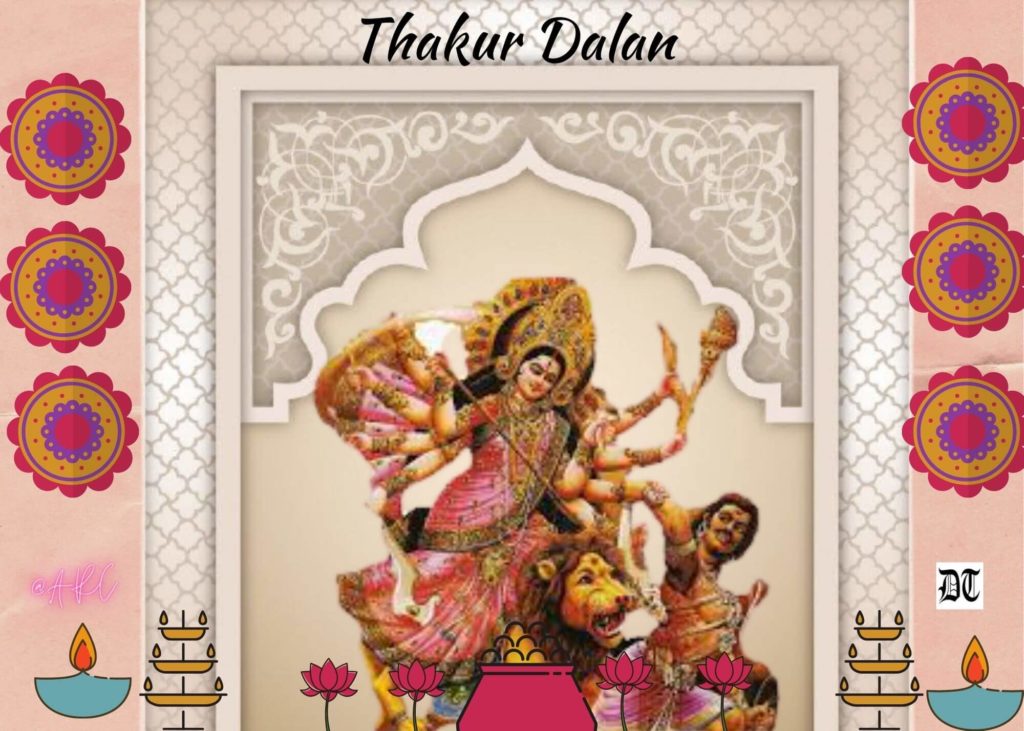
The ladies would adorn their feet with ‘aalta’ every evening. The ‘Naapit bou’ would come every day and apply altaa on all our feet, even those ladies who would visit us.
Maashis and Mamas and their children would be continuously dropping in.
My grandmother would perpetually be in the kitchen, either overseeing the ‘pujor samogri’ or overseeing breakfast, lunch, dinner for us all.
Dashami would come with its unique rituals of ‘Jaatra Mongal’ and ‘bhaashan’.
The deity would be carried on the shoulder to the Dighi, and placed on two boats. The boats would then separate and the deity would be immersed.
And then Didi, my grandmother and I would sit with small bronze buckets of Rasogolla, Paantua, Singaara and bonde.
That evening people would not stop visiting to pay respect to my grandparents on the occasion of Bijoya
My grandfather would be there greeting everyone at the upstairs sitting area
My grandmother would sit on an ‘ason’ on the floor of Alshekhana.
I would take my position with her.
And everyone who came would get a banana leaf full of these goodies.
It would be late into the night when the flow of people stopped.
We thrived in them
Moments are lived through spontaneously, in the joy of love and bonding.
History keeps rolling with every passing moment. Bricks and mortar are left behind. Some bits lost… for many reasons. Apparently, lost. Yet they live on within us. They make us who we are. Inseparably. Organically. Without a single premeditated thought.
History keeps rolling with every passing moment.
Bricks and mortar are left behind.
Some bits lost… for many reasons.
Apparently, lost
Yet they live on within us.
They make us who we are.
Inseparably.
Organically.
Without a single premeditated thought.
I can, even today, still taste the sweetness of the pantua that I helped my grandmother serve every Bijoya.
My grandparents lived without the trappings of positionings.
My grandfather was known to the people of his land as Baba or Father, my grandmother was known as Bouma, something her mother-in-law would call her and she never grew out of that salutation.
They never felt the need for any other salutation.
Every other trapping or title was given up at the altar of a new democratic nation.
They lived in turbulent times. Their land divided; their titles abolished. Generations of their way of life and ravaged by political unrest. And yet they embraced the real, in simplicity and grace. As does their daughter.
They lived in turbulent times
Their land divided; their titles abolished
Generations of their way of life and ravaged by political unrest
And yet they embraced the real, in simplicity and grace.
As does their daughter
The fragrances of that adventure home curls up within me at unexpected moments.
I carry them within me
The love, the people, the emotion, our forefathers
Not in historical archives or grandiose flamboyance or tell-tale stories
But simply, organically in my elements within my heartbeat
I carry them. All in my flesh and bones. Wherever I go, I am and will be forever rooted. Rooted in my legacy of love. Rooted in them. And Roots run deep…
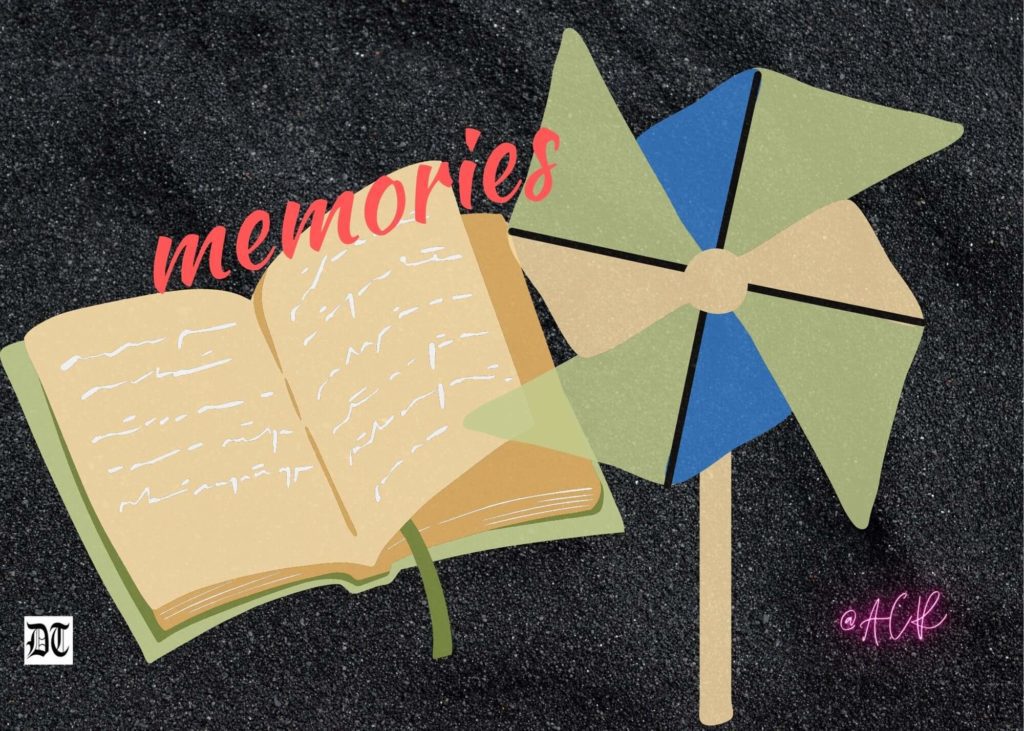
Notes
Babus: managers, a respectful address. Dhano Dhanye Puspe Bhora – a patriotic song by D.L Ray
Boro Jaguli – a town in Nadia district, Dhaba– roadside eatery, Nahabat khana – a gate,
Dighi – moat,
Deuri – From Dewar, main gate,
Khirki – Window with wooden shutters, Alshekhana – literally translates into the Idle room, a room for idling and unwinding, Poshak-kamra – translates to changing room, which also had the card table
Trilok – the three worlds: heaven, earth, and the netherworld
Bhog – food offerings to the Goddess. Thakur Dalan – the outdoor temple where the Goddess is worshipped
Lokkhi Pnecha – White owl, Goddess Lakshmi’s favourite, her vehicle too.
Dhuno – incense
Cheekh – Purdah made of bamboo used by the ladies of the house when they stepped outside
Pujor Samagri – goods needed for Puja. Aanchol – the long end of the saree,
Aalta – red adornment for the feet. Naapit bou – the barber’s wife who traditionally were the Aalta adorners
Ason – a square or rectangle mini carpet used for a person to sit.
Paantua, Rasogolla, Bonde – sweetmeats. Singara – savoury.
Jatra Mongol – a Puja ritual. Dada- Didi – I called my Maternal Grandfather MK Sourish Chandra Roy, Dada, my maternal grandmother, Tusharika Debi, Didi
Photo sourced by the author and visuals by Different Truths
Blog: www.ipsitaganguli.com

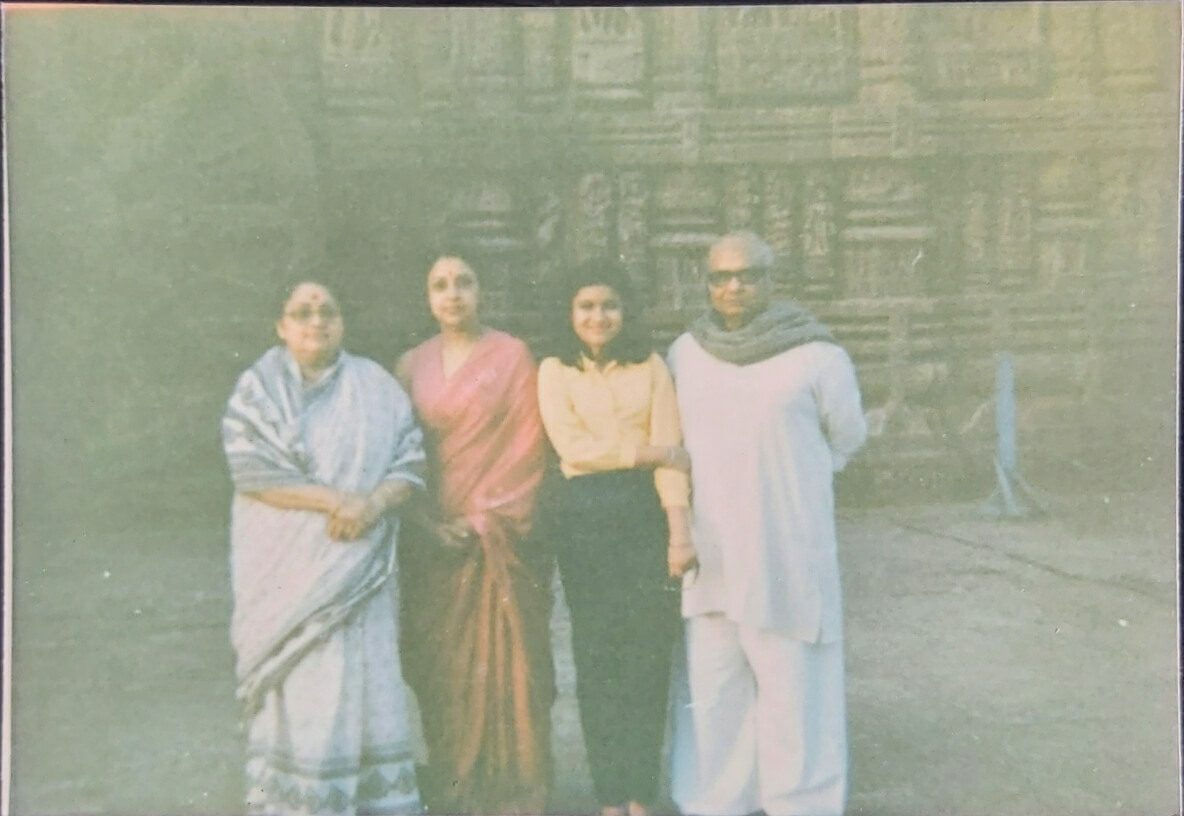
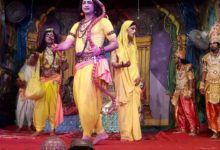
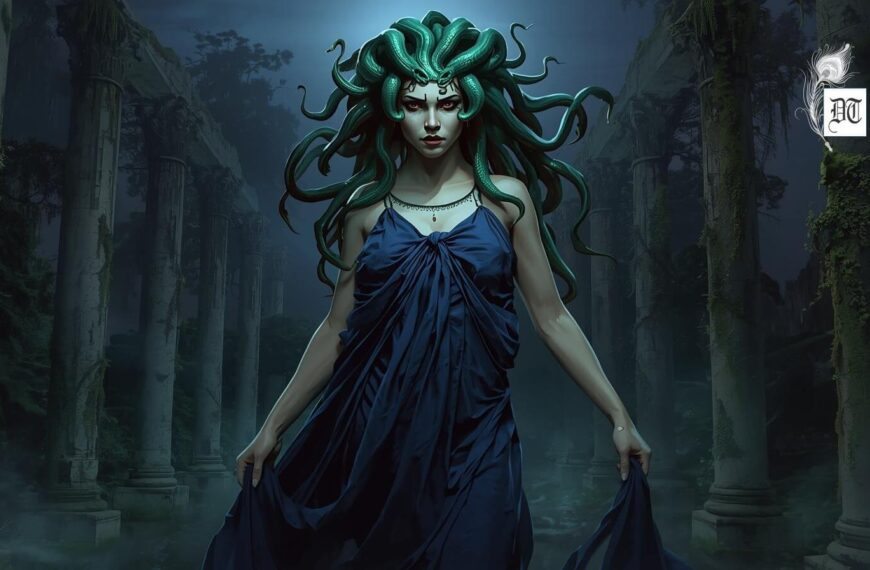
 By
By
 By
By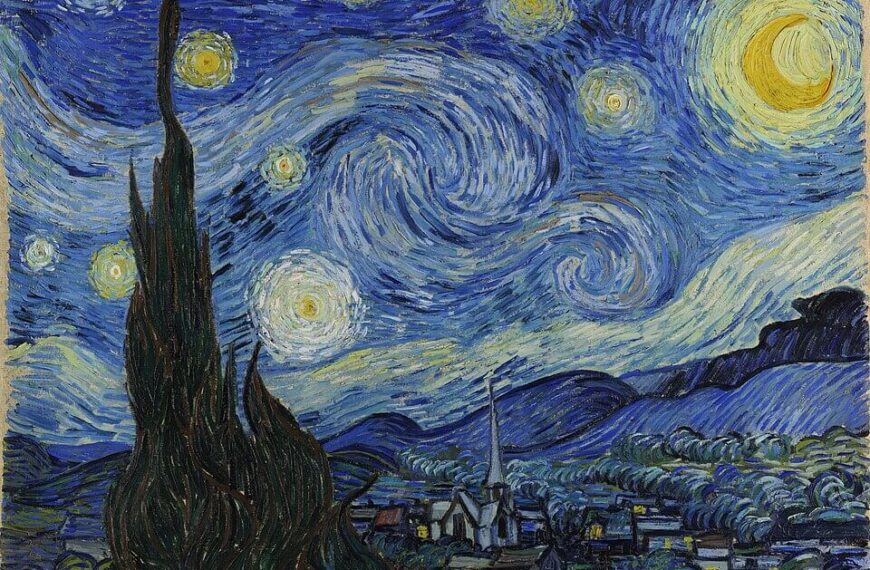
 By
By
 By
By